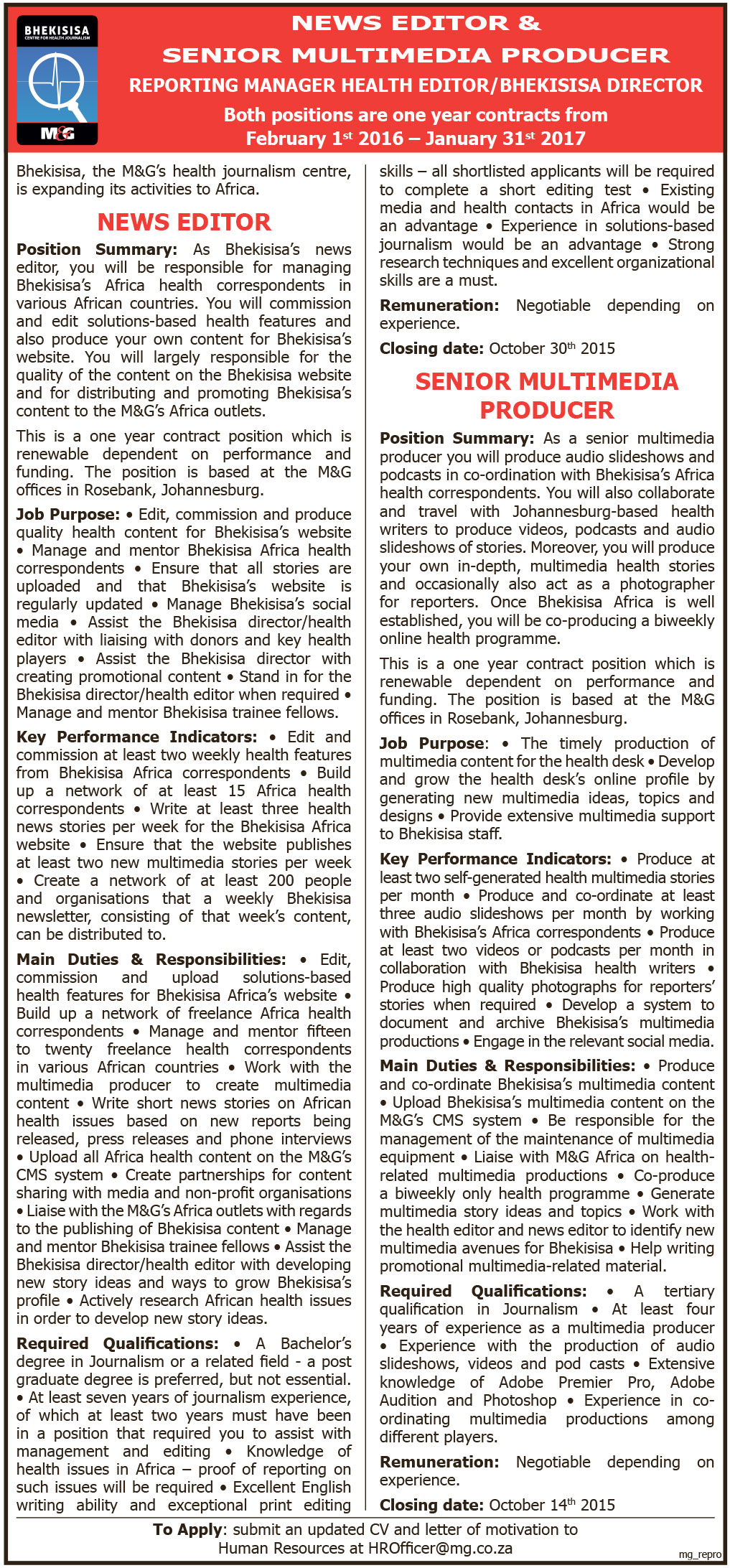Bhekisisa, the Mail & Guardian’s health journalism centre, will double its staff complement next year and expand its activities into Africa with the support of a generous grant from the Bill and Melinda Gates Foundation.
The foundation “recognises the valuable role that media can play in ensuring health issues stay on national agendas”, says Ayo Ajayi, Africa director of the foundation.
“The M&G has, through Bhekisisa, shown great commitment to health journalism over the years and this is reflected in the high quality of journalism in this area they have pioneered. We are happy to provide the M&G and its Africa outlets with an opportunity to contribute to raising the bar of health journalism in Africa.”
Bhekisisa was launched in January 2013 with a private-public partnership between the M&G and the German government’s aid arm, Gesellschaft für Internationale Zusammenarbeit (GIZ).
The centre produces in-depth health reporting, runs discussion forums on health issues and hosts trainee fellows from other media houses.
Significant impact
M&G chief executive Hoosain Karjieker said: “Over the past two and a half years, the M&G has seen the significant impact that health reporting can have on people’s lives and also policy processes in South Africa. Quality health reporting has since become an integral part of the newspaper’s identity. We are therefore very excited that the impact of Bhekisisa’s reporting will now be extended to the rest of the continent and also become an important part of M&G Africa’s content.”
Next March, Bhekisisa launches its own independent website, linked to the M&G’s Africa platforms. The centre’s online coverage will have a strong multimedia component run by a multimedia producer, who will work with in-country African health correspondents to produce audio slide shows and generate in-depth multimedia stories, including videos and podcasts.
All content will be promoted through the M&G and Bhekisisa’s social media platforms and a monthly online health programme, which will include interviews with reporters about their stories, will be presented once the African component of Bhekisisa is well established.
“By combining all these online platforms in its reporting, Bhekisisa will become one of the leaders in the M&G’s digital first strategy and set an example to the rest of the continent. We are very proud that health reporting has developed from [being] virtually nonexistent at the M&G to [being] one of the newspaper’s largest editorial departments,” said Karjieker.
Solutions-based journalism
Bhekisisa director Mia Malan said the centre’s stories will have a solutions-based approach. “We will focus on the solutions to health issues, and not only on the problems, so that we contribute towards lessons that African countries can learn from each other. Our stories will explain why and how a particular approach to a problem worked, or why it didn’t work. We will do that through various forms of storytelling, which will include 700- to 800-word reports by health correspondents in Africa, and long-form narrative journalism produced by our Johannesburg-based Bhekisisa reporters who will travel to African countries. We will also use multimedia productions.”
The centre will appoint an Africa health news editor, a project co-ordinator and a senior multimedia producer. Bhekisisa will employ 15 to 20 freelance health correspondents across Africa to report on health issues in their respective countries.
GIZ plans to continue supporting Bhekisisa by funding trainee fellowships, which will expand to include internships for final-year journalism students. The German government will also assist the centre with travel in South Africa, such as sponsoring a team to attend the international Aids conference in Durban next year.
Since its launch, Bhekisisa members have won 16 national journalism awards, including the overall Discovery Health Journalist award in 2013 and 2014 and the overall Standard Bank Sikuvile newspaper journalist of the year award in 2015.
Bhekisisa stories have had an effect on policy and resulted in political leaders taking action. In May 2013, a Bhekisisa article on pneumonia and rotavirus vaccinations was quoted by Health Minister Aaron Motsoaledi in his budget vote speech.
An investigation into how botched circumcisions affected the lives of initiates in the rural Eastern Cape in 2013 led to medical doctors and traditional leaders discussing ways to co-operate with each other to make initiation safer.
A feature about the struggle of an Eastern Cape home for the mentally disabled to get access to government funding resulted in several private donations and a government delegation visiting the home to assist with funding applications.
Earlier this year Bhekisisa investigated the deterioration of the Free State’s Dihlabeng hospital. After the article’s publication, Motsoaledi intervened.
The hospital’s doctors said four government delegations visited Dihlabeng within two weeks of publication: a national health department team, a presidential team, an Office of Health Standards Compliance team and Free State Premier Ace Magashule and his team met the hospital’s executive committee. All vacant posts mentioned in the article were filled shortly after the story’s publication and the hospital’s broken elevators were repaired.
An independent Media Monitoring Africa study shows self-generated M&G health content almost tripled between October 2012 and 2013 – 10 months after Bhekisisa was established. Social media reaction relating to health stories increased more than tenfold between 2012 and 2013.
Malan said: “Bhekisisa has shown that well-produced, in-depth health content can be mainstreamed and generate significant reaction.”
We’re hiring: Are you a multimedia producer or a news editor?

